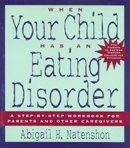| Holidays Present Opportunity to Detect Warning Signs of Eating Disorders in Children |
 |
By: Abigail H. Natenshon, MA,LCSW GCFP
The table is set, the company is about to arrive for
holiday dinner, and your child has just disappeared into her bedroom with a
stomachache. Are you aware that
this may be an early warning sign of an eating disorder?
Eating disorders afflict 8 –10 million Americans, 87
percent of whom are adolescents and children. Younger children are becoming
increasingly vulnerable, as the average age of disease onset has recently
dropped from 13 to 17 to 9 to 12.
A recent study reported that 40% of first graders surveyed were
dieting. Food restriction and
the fear of becoming fat, secretive eating and body image concerns can
signal an impending eating disorder in your child.
Early detection can
nip a growing problem in the bud.
Parents do not cause eating
disorders, but they can and must be instrumental in detecting early signs
and procuring timely and effective treatment as advocates for recovery.
Holidays can be a tip off
As the leaves turn colors and frost covers the
landscape at dawn, Thanksgiving and Christmas are in the air.
The upcoming holidays offer families an opportunity for togetherness
and joyful interaction; there is no better time to observe a child who may
be struggling with food and weight issues, as well as related emotional
problems. Eating disorders are
the behavioral tip of an emotional iceberg, the misuse of food to resolve
emotional problems; it is safe to say that their appearance is an indicator
that a child is struggling with problems of self esteem and self regulation,
with self-perception, judgment, and problem-solving. A child’s dread of
family gatherings or reluctance to spend time eating with loved ones, or in
public, to mark celebratory times may be a dead give away that the child is
suffering. These signs must be
considered a parent’s call to action.
Remember that eating disorders are more likely to show up at home, in
kitchens, bathrooms and bedrooms than in doctors’ offices, in physical
examinations or in laboratory tests.
Like it or not, parents are the most effective diagnosticians and
provide the first and best line of defense.
Early warning signs of eating disorders include:
-
Unhappiness with physical appearance
-
Depression, irritability, isolation from others
-
Fear of eating in front of others
-
Refusal to eat what others are eating; demanding alternative meals
-
Bringing his or her own special foods to family events.
-
Restricting the amounts, types, or food groups eaten.
-
Demonstrating food quirks such as drinking lots of water before meals,
cutting food up into tiny pieces and pushing them around plate, chewing
food and spitting into a napkin, eating the same foods every day,
demonstrating rigidity about times to eat or the order in which food is
consumed.
-
Needing to try on many outfits before finding one that “looks good.”
-
Complaining of stomachaches or other physical symptoms before meals.
-
Disappearance into the bathroom during or immediately following meals.
-
Failure to menstruate monthly.
What Parents should do
Parents and families must understand that the
malnourished child afflicted with an eating disorder or with behaviors that
mark precursors of eating disorder onset hasn’t the judgment or accuracy of
perception to acknowledge that these concerns exist, nor to assume any
degree of self-initiation or control in seeking solutions. Many
youngsters do not understand what healthy eating actually is. By taking
charge of the situation where their sick child is incapable of doing so for
herself, parents educate, nourish and prepare their child to eventually
resume self-regulation and self-determination
Taking charge of a situation
is not synonymous with taking control of the child.
Do not confuse appropriate parenting interventions with intrusive
parenting.
-
Parents need to provide nourishing food and meals, and consistently
model healthy eating behaviors.
Do not skip meals; sit down to eat with your child and family as often
as possible. (Only 50% of American families enjoy regular dinners
together.)
-
Intervene intelligently, knowledgeably. Confront the child with your
observations and concerns, with the dangers of ignoring an impending
eating disorder. Defining a problem is the first step towards finding a
solution.
-
Know thyself. Parents must understand that one’s own issues regarding
food and weight could inadvertently interfere with the ability to
accurately assess or respond to a problem in their child.
-
Don’t be afraid to be your child’s parent. Your child needs your support
and guidance now more than ever.
-
In seeking professional help, look for clinicians who will welcome you
as an intrinsic part of the treatment process and team, who are willing
to involve the total family in treatment and in creating and living a
healthy lifestyle.
Taking action
Not all eating quirks,
disordered eating, or food fears are precursors to clinical eating
disorders. When youngsters misuse food in an effort to resolve emotional
problems, parents have cause for concern. By recognizing an eating disorder
and tending to the emotional problems that underlie and drive it,
enlightened and empowered parents contribute to healing the total child.
When not part of the solution, parents are in danger of becoming part of the
problem.
|